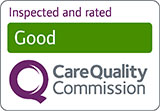Step Out
Programme Outline:
The Step Out programme is for students who have finished their initially funded course with QAC and who still have learning aims from the EHCP which can continue to be developed and progressed towards and enable them further participation in their adulthood.
The programme is about building on the independent living skills the students already possess so that when they leave QAC they are able to add value to their own lives through being as independent as they possibly can be. The programme also helps set up the students for their transition into adult services ensuring that they are moving on to something that they gain enjoyment and fulfilment from. The quality of the learning opportunities is monitored through the RARPA process to ensure a robust system is followed with challenging and relevant targets set and achieved.
We do this by taking the students out of the classroom environment and base them in a large residential building which is off campus. Here they have access to a more relaxed practical way of learning with access to all rooms where they can practice and learn independent living skills.
Timetabled sessions include gardening, cleaning, cooking, arts and crafts, project and community sessions. All sessions are planned and delivered so that students have opportunities to reach their EHCP outcomes. Other skills that students build on in all sessions are fine-motor skills, choice making, communication skills, English and Maths to use in everyday life skills, asking for help and, for some students, taking a lead.
Students access the community where they learn social behaviours and how to keep safe when out in the community. Students learn how to communicate effectively and safely with the wider public. We learn the value of money and how to make a purchase in the local shops. Students learn the importance of planning their outing so they are prepared. Students plan their lunch menu and purchase the ingredients needed to make their own lunch.
All students take an active role in maintaining cleaning routines and work together to complete daily jobs. We look at what the students want for their future and for some students this may mean taking part in work experience and accessing the world of work.
The Step Out programme is fun, engaging, friendly, enabling, inclusive and full of new experiences. It provides a great opportunity to develop independent living skills and achieve aspirations for adult life.
Typical Week:
Students attend 3 days a week at QAC (9:00am to 3:00pm), funded by the Local Authority with the other 2 days accessing other provisions in the community funded by Adult Social Care (ASC). There are 2 programmes depending on individual needs and pathways for the 3 days. Pathway A’s core focus is a Sensory and Communication provision and Pathway B’s core focus is a Practical provision, see below (PfA = Preparation for Adulthood links):
Pathway A Sensory and Communication Provision can include:
- Building up tolerances (PfA Health and Community Inclusion)
- Carrying out routines (PfA Independent Living)
- Focus on life skills (PfA Independent Living)
- Movement, fitness, sensory healthy living (PfA Health)
- Enterprise projects (PfA Employment)
- Accessing Community (PfA Community Inclusion)
- Developing communication with staff, peers and key people in the community
Pathway B Practical Provision can include:
- Emphasis on communication in the community and work
- Focus on enterprise projects – possible running of a shop in final term (PfA Employment)
- Life skills - Shopping for and cooking lunches (PfA Independent Living)
- Healthy Living in the community (PfA Health)
- Using community services (PfA Community and Inclusion)
- English and Maths to use in everyday life skills (PfA community and inclusion and health)
Progression:
Step Out helps prepare students who have been in an educational setting for the majority of their life to begin to learn new patterns and routines for the day to support transition to adult social care (ASC), to include use of personal assistants, day centre provision and voluntary work provisions, as appropriate to the student.
By the end of the programme students are ready to transition into adult social care full time and to take a more active role in their own lives.











